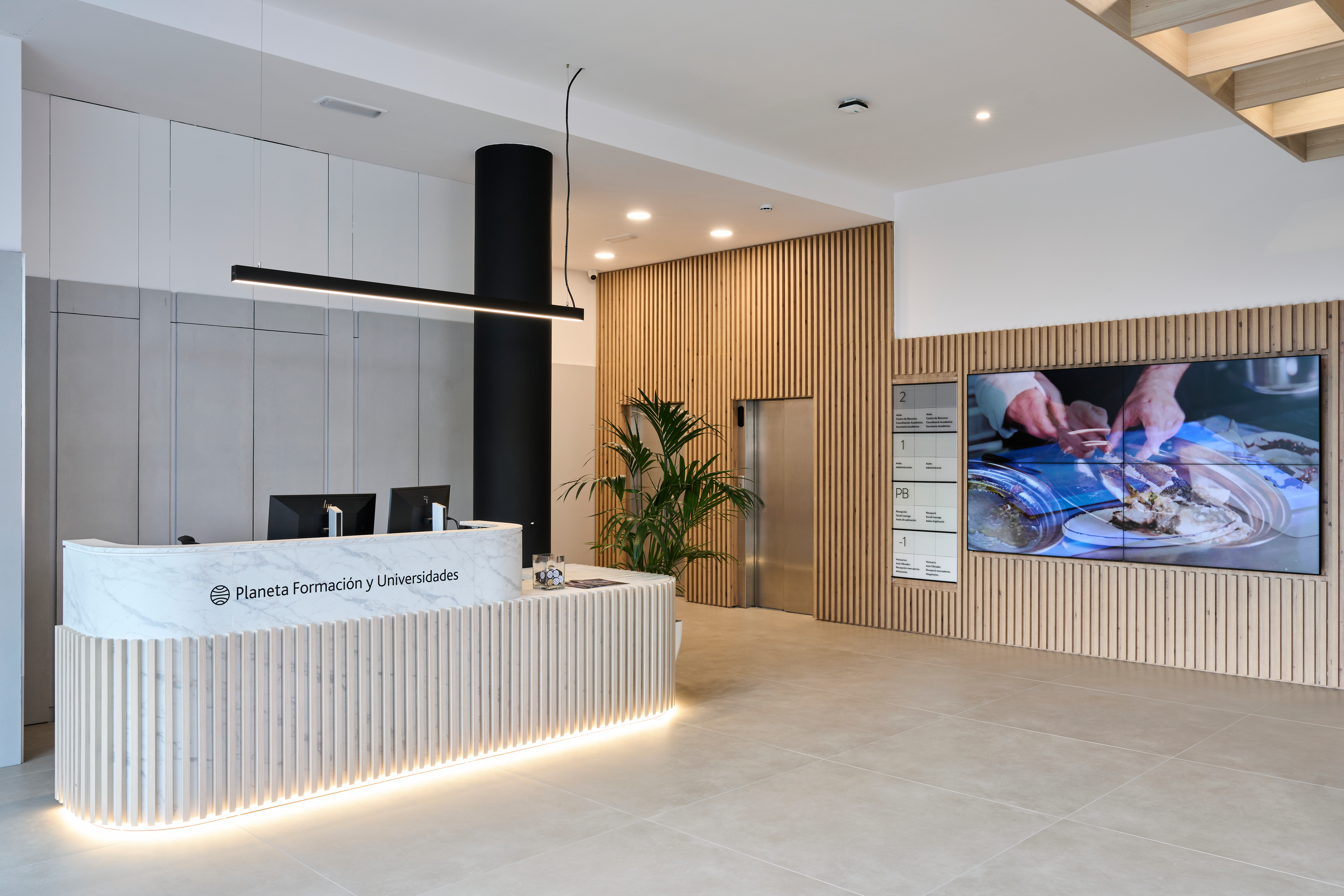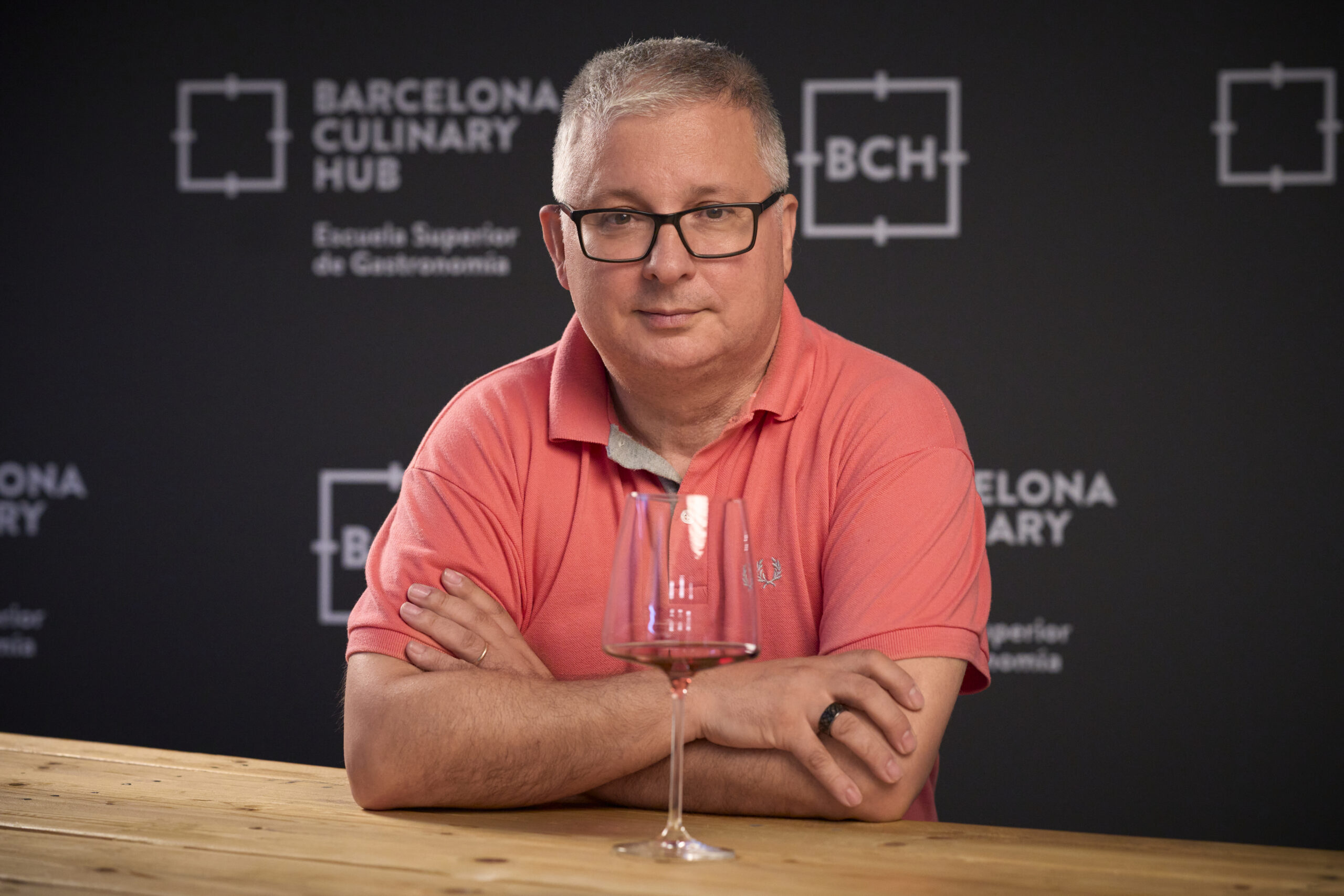Behind this innovative proposal is the Barcelona Culinary Hub (BCH), a unique and unprecedented model that, in addition to offering training in haute cuisine and other areas related to the sector, is also a business school linked to gastronomy.
But what is this gastronomic Hub that goes far beyond that?
The Barcelona Culinary Hub (BCH), is different from any other higher school of gastronomy because it is the first to present a vision of the gastronomic industry and business, in the teaching of each area, in the development of gastronomic projects, in creativity and in culinary techniques. Barcelona Culinary Hub has a wide range of university courses geared to the current needs of gastronomy beyond haute cuisine. It is the first school of higher education in the sector that works with a 360º vision of the industry.

The Barcelona Culinary Hub has a wide range of university courses geared towards the current needs of gastronomy. Photo: Barcelona Culinary Hub
The school was born in 2020 in Barcelona with exclusive online courses, although from 2022, it also offers classroom training. The BCH arises in the context of a city with a great entrepreneurial tradition and a world gastronomic destination. Where gastronomy is an essential part of its culture and has a good quality of life. Barcelona is also the birthplace of great culinary firms and has multi-awarded gastronomic businesses. But it is also home to more than 1,400 startups, with an increase of more than 40% in the last 3 years.
The BCH is committed to teaching adapted to the latest trends and a business vision of the world of catering. With the aim of transmitting experience, technical and business knowledge that combines business vision with communication skills and culinary competences. Without renouncing the principles of the centre’s philosophy such as: sustainability, digitalisation and innovation. In addition to a strong commitment to the environment, ecology and the development of the local ecosystem.
This is how the BCH management defines itself: “We are the centre of culinary activity and a driving force in the sector. We offer a projection to the world of Mediterranean cuisine, sustainability and digitisation, and we have a great team of internationally recognised professionals. Each and every one of us adds value to make us the Gastronomic HUB. Our origin is in Barcelona and we follow the guidelines set by the city: plurality, avant-garde and innovation”.

Barcelona Culinary Hub reception: Photo:Barcelona Culinary Hub.
BCH offers a Bachelor’s Degree in Gastronomic Management and Direction (face-to-face) and eight specialised continuing education masters: six (online) and two face-to-face. The BCH offers different options and programmes for students looking to start their professional career, update their knowledge, learn about new trends, innovate, undertake and become professional in any gastronomic area.
For all this, the school has a campus of 4,000m2 that includes classrooms dedicated to gastronomic research (Gastro Lab), food development and design (FOOD+ID, and active learning, (self-learning through debates and practices). To develop its courses, the BCH has brought together great professionals who stand out in areas such as: chefs, marketing, innovation, communication, finance, product, logistics and entrepreneurship, among others.
The eight masters
Master’s Degree in Management and Innovation in Haute Cuisine. It is directed by Joel Castanyé, Chef revelation by the Catalan Academy of Gastronomy and Nutrition and owner of La Boscana, (Michelin star and two Repsol suns). The Master’s Degree in Continuing Education in Professional Pastry Making. It is directed by Eric Ortuño, one of the most renowned pastry chefs, and head of the patisserie l’Atelier.
Master’s Degree in Entrepreneurship and Acceleration of Gastronomic Businesses, directed by Belén Villodas. The Master’s Degree in Gastronomic Marketing and Digital Management. Directed by Diego Coquillat.
Master’s Degree in Restaurant Management and Administration. It is directed by Javier de Las Muelas, entrepreneur, trendsetter, and a cocktail benchmark.

Barcelona Culinary Hub facilities. Photo: Barcelona Culinary Hub.
Master’s Degree in Product and Sustainable Gastronomic Creativity. It is co-directed by three great chefs: Xavier Pellicer, specialist in vegetable products and winner of the World’s Best Vegetable Restaurant Award in 2018 and 2021; Rafa Zafra, executive chef at Estimar (Barcelona and Madrid) and Casa Jondal, and specialist in marine products, and Oriol Rovira, from Els Casals and specialist in meat products.
Master of Continuing Education in Innovation in Food & Beverage. It is directed by Pere Monje, director and owner of the Via Veneto restaurant in Barcelona. The Master’s Degree in Wine Business and Wine Management (Classroom-based). Directed by Ramón Francàs, a benchmark in the sector, journalist and sommelier.

Kitchen facilities at Barcelona Culinary Hub. Photo: Barcelona Culinary Hub.
Planeta Training and Universities
Barcelona Culinary Hub is a Centre attached to the University of Barcelona, and also has a collaboration framework with the Culinary Institute of America, and Harvard T.H.Chan School of Public Health, participating in the Sustainable Culinary Thinklab.
It is also part of Planeta Formación y Universidades of Grupo Planeta. With more than 100,000 students of 114 nationalities in 23 business schools, universities, specialised colleges and professional training centres in Spain, Andorra, France, Italy, North Africa, the USA and Colombia.
First master’s degree focused on training professionals in business management in the wine sector
Barcelona Culinary Hub presents the first master’s degree focused on training professionals in the business management of the wine sector, an industry in constant evolution and growth (it had a turnover of 3,062 million euros last year in Spain). It is driven by the need for highly qualified and specialised professionals in the business management of the wine sector in areas such as marketing, sales management, logistics and distribution, quality management and innovation in wine production.

First master’s degree focused on training professionals in business management in the wine sector. Photo: Barcelona Culinary Hub.
The Spanish Wine Federation (FEV) highlights, for example, that Spain is the largest vineyard in the world with 914,086 hectares, 13% of the world total and 97 protected designations of origin. Spain has around 4,200 wineries (3,500 are exporters), and this sector is one of the most international, reaching 189 countries around the world. It is also the leader in organic vineyards, with 121,200 hectares of vineyards.
The figures make explicit why the sector is in need of “state-of-the-art” training. Because of the changes taking place in the market, the wine industry, which now claims to be highly competitive, also admits to a lack of preparation in in-depth market knowledge, branding and supply chain management, all of which are essential for success in this sector.
The director of the master’s degree: Ramón Francás .
The course is called the Barcelona Culinary Hub’s Master’s Degree in Lifelong Learning in Wine Business and Wine Management. Its long title clearly explains what the director and soul of the course, Ramon Francàs, intended. He stresses “the importance of constant training to undertake any successful business in the wine sector and describes the Spanish wine market as a sector in effervescence where great wines are produced”.
Ramón Francás, is a journalist and sommelier, an expert in the world of wine, and a specialist in La Vanguardia. His passion and knowledge of wines and sparkling wines has led him to travel the entire wine geography, wineries, vineyards, restaurants and shops for more than 30 years. For Ramón “The wine sector has a dynamism that other agri-food sectors do not have and therefore the novelties are fast-paced, so training must be constant”.

Ramón Francás, journalist and leading sommelier, director of the master’s degree in wine. Photo: Barcelona Culinary Hub.
The Master in Lifelong Learning in Wine Business and Wine Management offers a unique 360º training. Focused on training professionals capable of effectively leading and managing wine companies, standing out in this increasingly demanding market.
It is taught online with the possibility of a face-to-face experience at the end of the programme. With activities where students will discover the secrets of the world of wine in Catalonia. Through masterclasses, educational outings to vineyards and wineries, tastings and meetings with experts sommeliers.
In the words of Ramon Francàs “Our first value is the professional experience of our teachers, through whom we offer unique training, superior to what already exists as it goes a step further. We provide tools so that professionals can grow professionally based on real case studies”.
Master’s degree in wine: syllabus
The curriculum consists of six modules with 10 credits each. The modules are Challenges and opportunities in the wine sector; Innovation in the value chain; Brand reputation and wine; Business models and viticultural expansion; and Wine and strategic alliances:
1/ Challenges and opportunities in the wine sector
Opportunities, threats and trends in consumption, production, distribution, management and marketing. This module also covers the regulatory framework for wine with new developments in labelling, international wine organisation, European directives, local regulations and monopolies. Also sustainability certifications such as Demeter (biodynamic), Biosphere and wines for vegans. And new regenerative proposals and multilateral organisations such as the OIV and WTO.

The master’s degree in wine is made up of 6 modules to get a good understanding of the wine sector. Photo: Barcelona Culinary Hub.
2/ Value chain innovation
Or how to implement innovation in the development of wine products according to the latest needs. In addition to leading and promoting innovation in the sector and developing innovative solutions for wine companies in complex environments.
3/ Reputation and wine
Building reputation is communicating wine: strategic and marketing plans, brand creation, reputation and loyalty according to the target. Brand development: targeting and pricing; distribution formulas, e-commerce and new forms of distribution. Branding and positioning elements (packaging and labelling) and retail and wholesale management.
4/ Business models and winegrowing expansion
Learn and implement different business models based on the value-profitability axes. Learn strategies for national and international expansion and export and import of wine worldwide.

Photo: Jordi Català
5/ Wine and strategic alliances: wine tourism and sustainability
Models and plans for the development of enotourism destinations, models of sustainability in production. Links between sustainability of a territory and development of its enotourism destination.
6/ Business models: value and profitability.
National and international expansion strategies, internationalisation of the sector and export and import.



